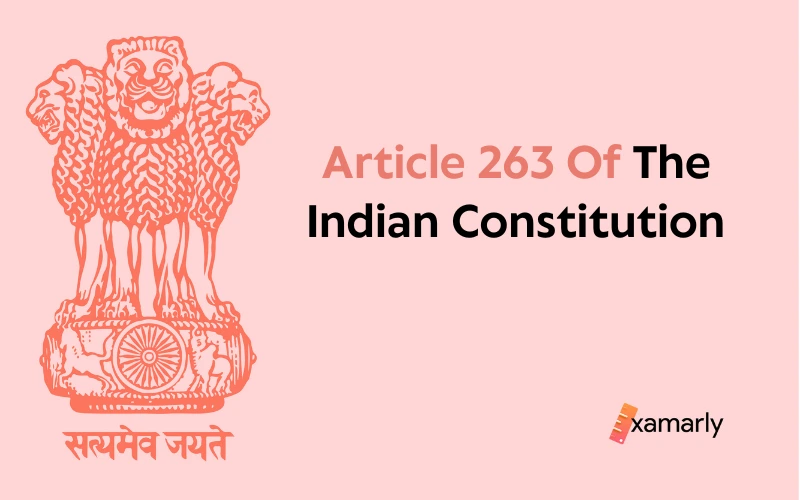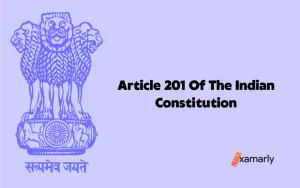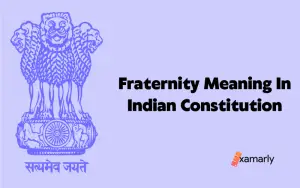Do you know what is Article 263 of the Indian Constitution? Do you know how it operates to build a better relationship between the states in the country? What are the provisions relating to an Inter-State Council established under this article?
The Indian Constituent Assembly adopted the Constitution of India on November 26, 1949. It came into force on January 26, 1950. Since then, it has been amended several times and many chapters have been added as well. One of these chapters is Article 263 which contains provisions related to an inter-State council that gives advice to the union government and helps maintain good relationships between different states in India by resolving their issues and disputes.
This piece explores provisions relating to an Inter-State Council as set under Article 263 of the Indian Constitution, including its powers and composition. It also looks at how this council helps amicably resolve conflicts between different states and promotes cooperative federalism for smoother functioning of interventions by both centre and state governments in various policy domains.
What Is Article 263 Of The Indian Constitution?
The provisions relating to an inter-State council are specified under Article 263 of the Indian Constitution. Additionally, it contains the following provisions:
If the President ever decides that it would be in the public interest to form a Council with the duty:
- (a) to investigate and provide advice on conflicts that may have arisen between states;
- (b) of investigating and debating matters in which some or all of the States, the Union, and one or more of the States have a shared interest; or
- (c) of providing recommendations on any such issue and, in particular, proposals for the better coordination of policy and action with respect to such a subject,
it shall be lawful for the President to issue an order establishing such a Council and outlining the nature of the responsibilities that are to be carried out by it, as well as its organizational structure and operating method.
When Inter-State Council Was Established?
On May 28, 1990, based on the proposal of the Sarkaria Commission, the President issued an order that formally constituted the ISC as a permanent body.
Furthermore, the Inter-Governmental Council (IGC), a permanent Inter-State Council, should be established in accordance with Article 263 according to the recommendation of the Commission on Centre-State Relations, which was headed by Justice R.S. Sarkaria. In accordance with the suggestion made by the commission, the ISC has been constituted.
It cannot be abolished and re-established. As a result, the ISC’s current position is that of a permanent constitutional body.
When Article 263 Was Approved?
The President could create an interstate council under the proposed Draft Article 246 (which is re-named Article 263). If it seems that creating such a Council will advance public interests, the President may take that action. The Draft Article was not subject to discussion. On June 13, 1949, Draft Article 246 was approved.
Duties Of The Council
The constitution also specifies certain responsibilities for the council and these are as follows:
- Inquiring into and advising on any conflicts that may develop between the states
- investigating and discussing topics that the states or the centre and the states having a common interest
- making suggestions on any topic to improve the coordination of policy and action
Composition Of The Council
One of the main suggestions of the Sarkaria Commission was to establish a permanent Inter-State Council, which would serve as an unbiased national forum for consultation with a well-defined purpose in accordance with Article 263 of the Indian Constitution.
- Prime Minister, who is the Chairman of the Council
- Chief Ministers of all the states
- CM of Union Territories having legislative assemblies
- Administrators of UTs not having legislative assemblies
- State Governors under the President’s rule
- Six Central cabinet ministers, including the home minister, are to be nominated by the PM
- Five ministers of the cabinet rank are permanent invitees of the council
Highlights Of The 11th Inter-State Council Meeting
The following are some of the highlights from the 11th Inter-State Council Meeting:
- Addressing major Centre and State relations issues and topics related to the Punchhi Commission
- Intelligence security
- Decking with the danger of terrorism
- Aadhaar and its benefits
- Public service interest
- Police Modernisation
Prime Minister Narendra Modi served as the chairman of the council during the 11th ISC session. A large number of chief ministers representing 17 different states attended the council meeting. The meeting covered matters of public interest. This was the first meeting of the ISC in almost ten years. The attendees regarded the ISC meeting as a success.
Winding UP
Article 263 of the Indian Constitution covers provisions with respect to an inter-State council. A consultative organization called the Inter-State Council is responsible for looking into and discussing matters of mutual interest between the Union and a state or states. In order to avoid disagreements, this article discusses the ties that must be built between the central government and the state governments.
For additional readings:
| Article 257 Of The Indian Constitution | Article 256 Of The Indian Constitution |
| Amendment Of Indian Constitution and Basic Structure Theory | Significance Of National Anthem Of India “Jana Gana Mana” |
FAQs
What Is Article 263 Of The Constitution Of India About?
Provisions relating to an inter-State council are covered by Article 263 of the Indian Constitution.
What is the Inter-State Council?
The Inter-State Council is intended to serve as a forum for the states and the Union to discuss and resolve issues of common concern and to promote cooperation and coordination between the states and the Union. It has played an important role in fostering inter-state cooperation and resolving inter-state disputes in India.
Who Is The Chairman Of The Interstate Council Constituted Under Article 263 Of The Indian Constitution?
Prime Minister is the Chairman of the Inter-State Council.





![Diwan i Risalat [Foreign Affairs Department] - Delhi Sultanate 4 Diwan i Risalat](https://blog.examarly.com/wp-content/uploads/2022/08/Diwan-i-Risalat-1-e1676965861513-300x188.webp)
